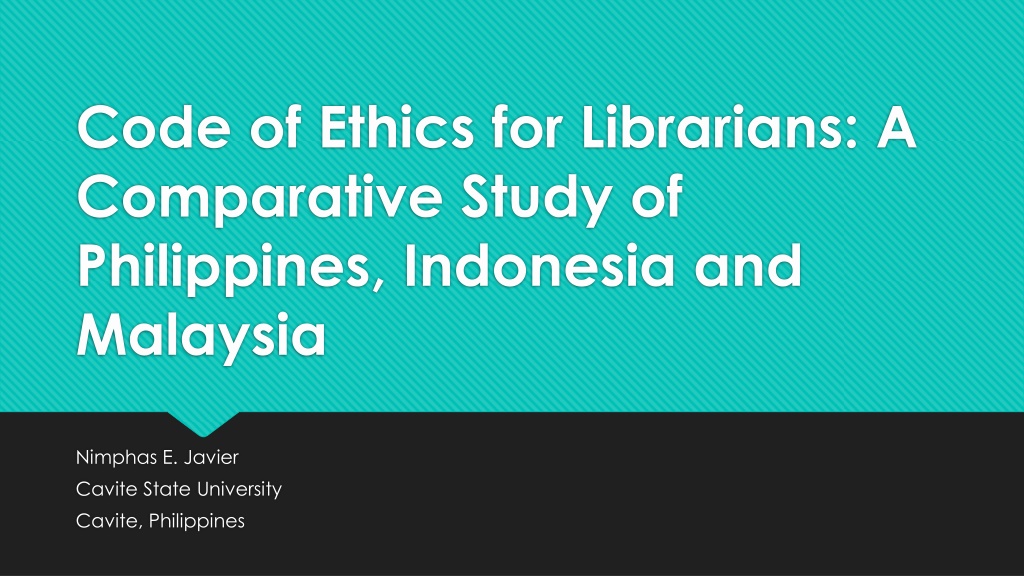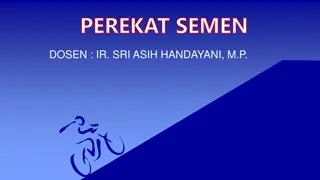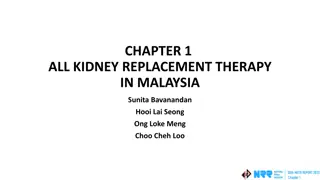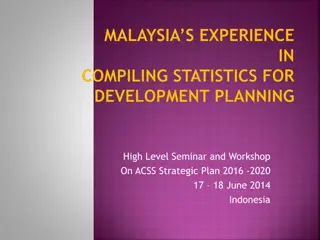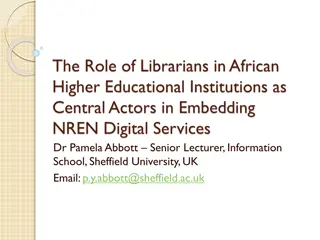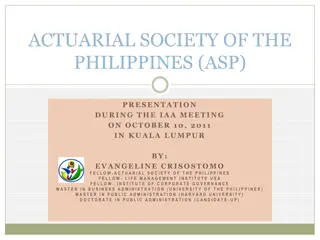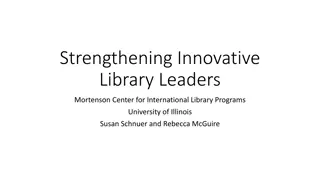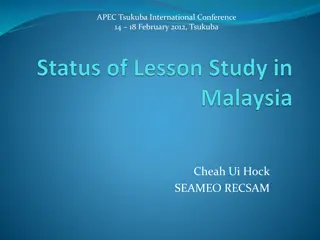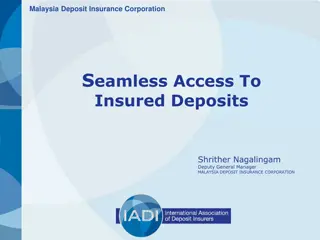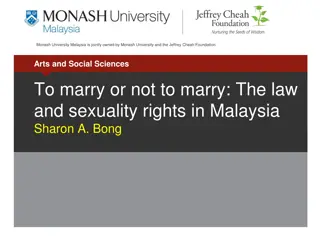Comparative Study of Code of Ethics for Librarians in Philippines, Indonesia, and Malaysia
This comparative study delves into the Code of Ethics for Librarians in Philippines, Indonesia, and Malaysia, exploring their history, components, and significance. Highlighting the importance of ethical guidelines, it emphasizes how codes of ethics serve as a foundation for professional conduct, quality service delivery, and organizational frameworks within the field of librarianship.
Download Presentation

Please find below an Image/Link to download the presentation.
The content on the website is provided AS IS for your information and personal use only. It may not be sold, licensed, or shared on other websites without obtaining consent from the author. Download presentation by click this link. If you encounter any issues during the download, it is possible that the publisher has removed the file from their server.
E N D
Presentation Transcript
Code of Ethics for Librarians: A Comparative Study of Philippines, Indonesia and Malaysia Nimphas E. Javier Cavite State University Cavite, Philippines
Outline o Introduction o History of the Code of Ethics for Librarians o Comparison of the Code of Ethics for Librarians: Philippines, Indonesia and Malaysia o Findings o Conclusion o References
Introduction o What does Code of Ethics reflect? o profession's customs or standards o professional ethics o culture and socioeconomic conditions influence ethical decisions (Vanasco, 1994) o culture necessarily implies ethics, ethics do not necessarily imply culture (Hall, 1997)
Why is Code of Ethics essential to the profession? it will provide an ethical starting point for the professionals and for others outside the profession o It will ensure quality in treatment of members of the profession and those the profession serves o It will provide a framework for conducting essential information functions, instituting policies, and developing strategies for service o (Rubin, 2010, p.324).
History of Code of Ethics for Philippine Librarians August 14, 1992 Board for Librarians (BFL) had approved a Code of Ethics through Resolution No. 2 Preamble Article 1. Librarians with the State, Society and Public Article 2. Librarians with Librarianship Profession Article 3. Librarians with the Suppliers, Publishers, Dealers, etc. Article 4. Librarians with the Clients and/or other Users of their Professional Services DISCIPLINARY ACTION SEPARABILITY CLAUSE
Comparison of the Codes of Ethics General Information about the Codes of Ethics Philippines Indonesia Malaysia Composed of eight (8) statements No Disciplinary Action No Separability Clause Broad in scope, it defined librarians ethical behavior/role with the state, society and public; (with 4 sub articles) with the librarianship profession; (with 11 sub articles) with the suppliers, publishers, dealers, etc.; (with 3 sub articles) and with the clients and/or other users of their professional services (with 4 sub articles) Disciplinary Action Separability Clause Broad in scope 3 chapters Chapter I Definition of Librarian Chapter II Common duties (with 5 statements) Chapter III Duties to the organization and profession (with 3 statements) No Disciplinary Action No Separability Clause
Purposes of Formulating the Code of Ethics for Librarians Philippines Indonesia Malaysia To be able to define Filipino librarians ethical behavior/role with the state, society and public; the librarianship profession; the suppliers, publishers, dealers, etc.; the clients and/or other users of their professional services The Association of Indonesian Librarians, Ikatan Pustakawan Indonesia states the code of ethics for librarians in awareness of their existence and of their role in the society A written code of ethics was formulated by Library Association of Malaysia to guide the professional conduct to enhance the professional image of librarians in Malaysia.
To what extent these codes educate and guide the new professionals? Philippines Indonesia Malaysia Category Ethical behavior of librarians with librarianship profession - has eleven (11) statements Category Ethical behavior of librarians with librarianship profession - has three (3) sub- statements Category Ethical behavior of librarians with librarianship profession - has two (2) statements
Areas/fields covered by the Codes of Ethics Philippines Indonesia Malaysia Defined the librarians ethical behavior/role with the state, society and public; (with 4 sub articles) with the librarianship profession; (with 11 sub articles) with the suppliers, publishers, dealers, etc.; (with 3 sub articles) and with the clients and/or other users of their professional services (with 4 sub articles) Disciplinary Action Separability Clause 3 chapters Chapter I Definition of Librarian Chapter II Common duties (with 5 statements) Chapter III Duties to the organization and profession (with 3 statements) Composed of eight (8) statements that covered the librarians role to the community it serves, ethical behavior towards the clients, co-workers and fellow librarians
Type/s of ethical problems not addressed by the Codes Philippines Indonesia Malaysia Failed to have written statements relating to ethical behavior of librarians with the suppliers, publishers, dealers, etc.
Conclusion A code of conduct can promote ethical understanding, and the library association can offer training and advice in ethical conduct to ensure that individuals and library institutions comprehend the distinction between ethical and unethical behavior. Filipino, Indonesian and Malaysian Librarians adhere with the Code of Ethics for Librarians of their respective countries. The Code of Ethics for Philippine Librarians is more comprehensive and detailed while both the Code of Ethics for Indonesian Librarians and Code of Ethics for Malaysian Librarians are too general.
References Byrd, Gary D. (2014). A Comparative Analysis of Moral Principles and Behavioral Norms in Eight Ethical Codes Relevant to Health Sciences Librarianship, Medical Informatics, and the Health Professions. J Med Libr Assoc v.102(4): 247-256. Gani, Fuad and Zen, Zulfikar Reinventing Library Association: Indonesia s experience and perspectives. (2009). In 14th Congress of Southeast Asian Librarians, Hanoi, Vietnam, April 20-23, 2009. [Conference paper] Hansson, Joacim. (2016). The Documentality of Ethics-Codes of Library Ethics as Support of Professional Practice. Proceedings of the Document Academy. 3. 1-14. 10.35492/docam/3/1/8. Hoffman, Kathy. (2005). Professional Ethics and Librarianship. Texas Library Journal 81, (3) (Fall): 96-101. Mohd Nor Bin Mat Salleh. (2009). Code of Ethics Information Professional in Context (retrieved December 12, 2016 at http://www.academia.edu)
References PRC Resolution No. 6 series of 2006 dated September 13, 2006 PRC Resolution No.2 series of 1992 dated August 14, 1992 Republic Act No.9246 Rubin, R. & Froehlich, T.J. (2010). Ethical Aspects of Library and Information Science. In: M. Bates (Ed.), Encyclopedia of Library and Information Sciences, 3rd ed., pp.1743-1757. Boca Raton, FL: CRC Press. Santos, Antonio M. (2003). The Professionalization of Librarians in the Philippines: the Role of Library Associations. World Library and Information Congress: 69th IFLA General Conference and Council. Shachaf, P. (2005). A Global Perspective on Library Association Codes of Ethics. Library & Information Science Research, 27(4), 513-533. http://www.pnri.go.id/IPI/Ipi.htm --
